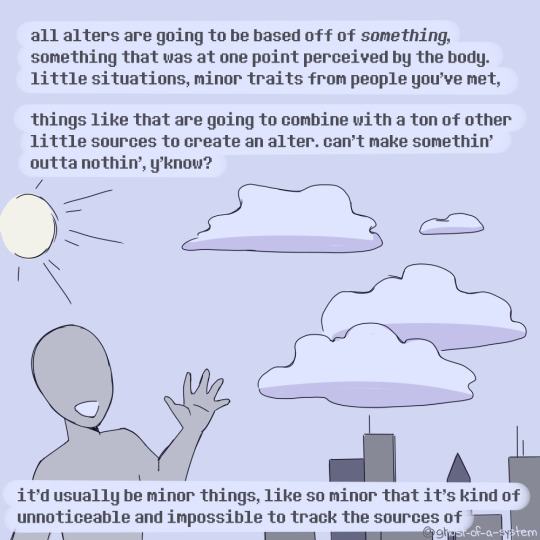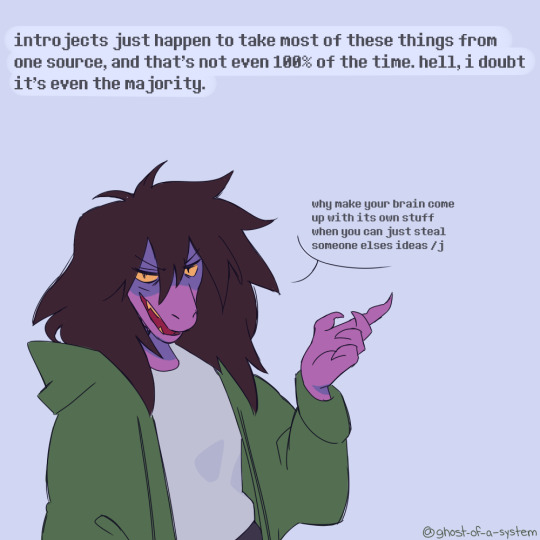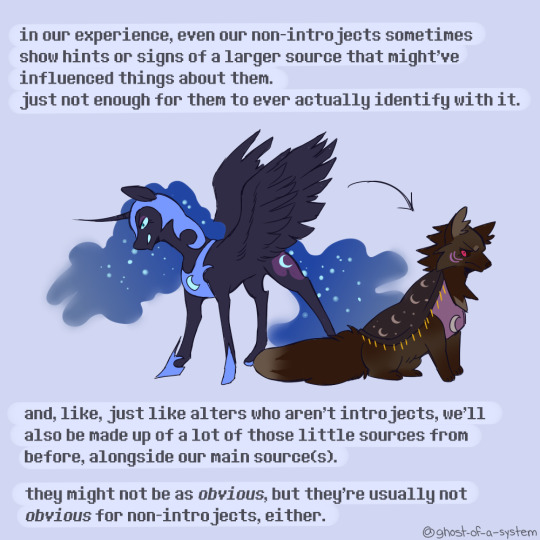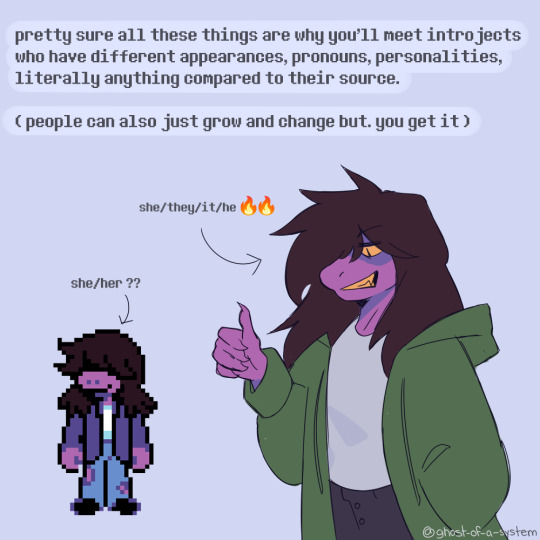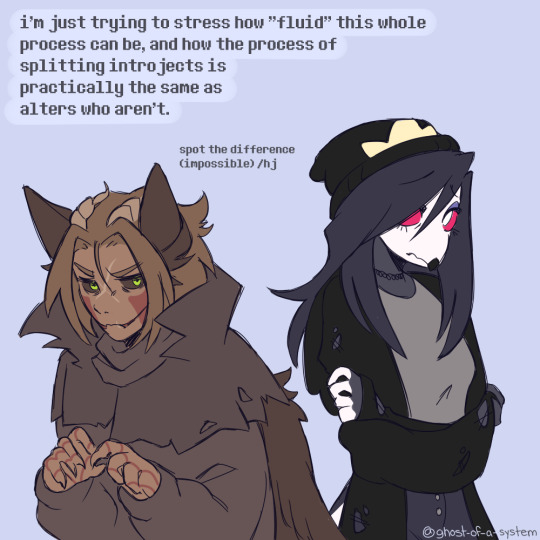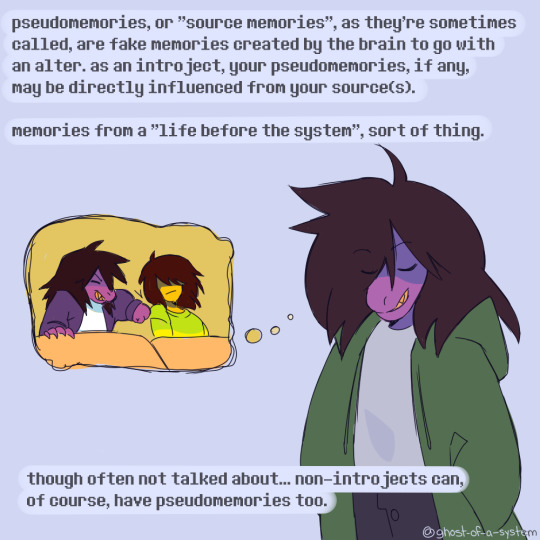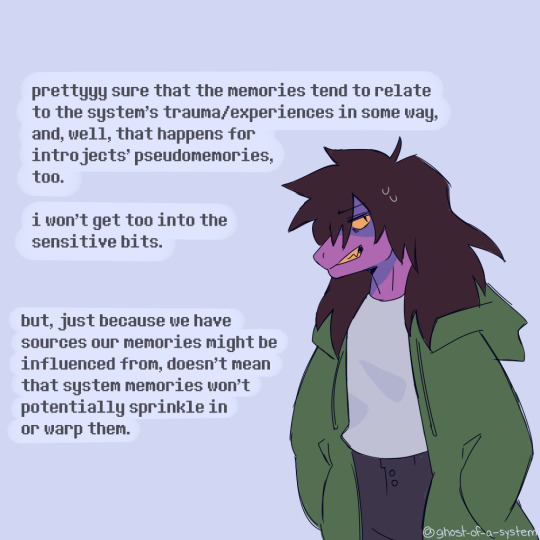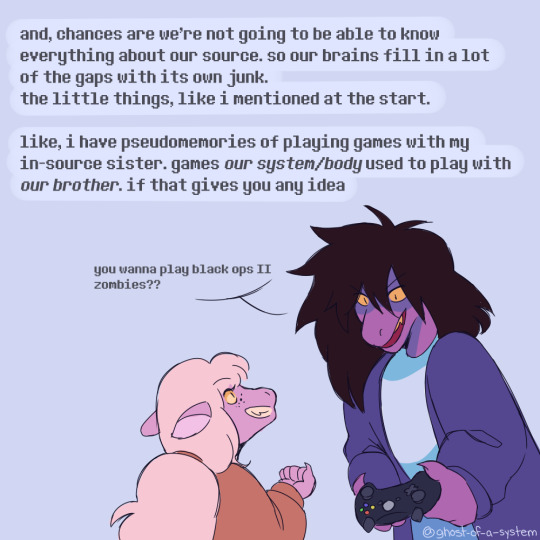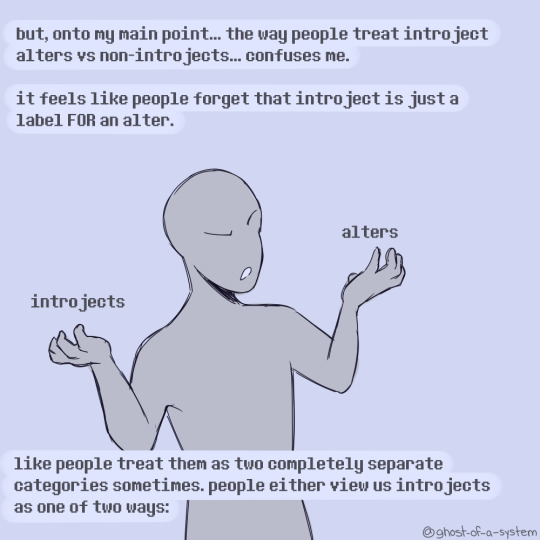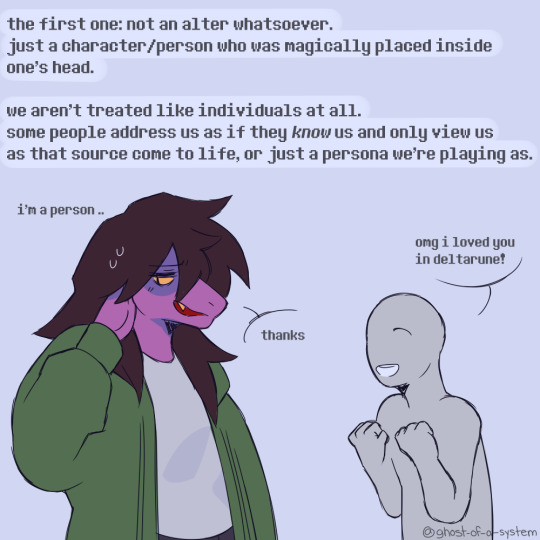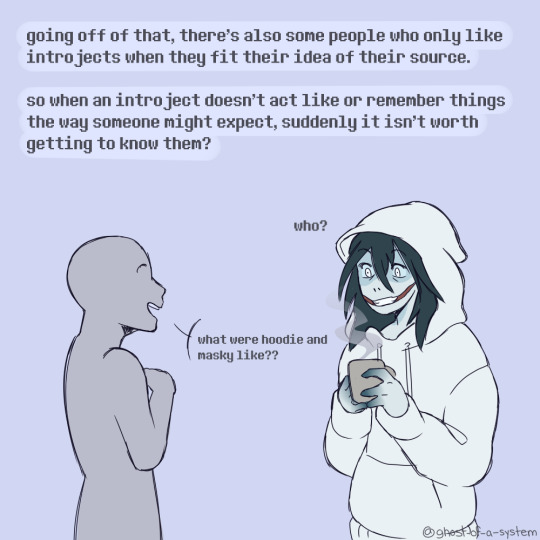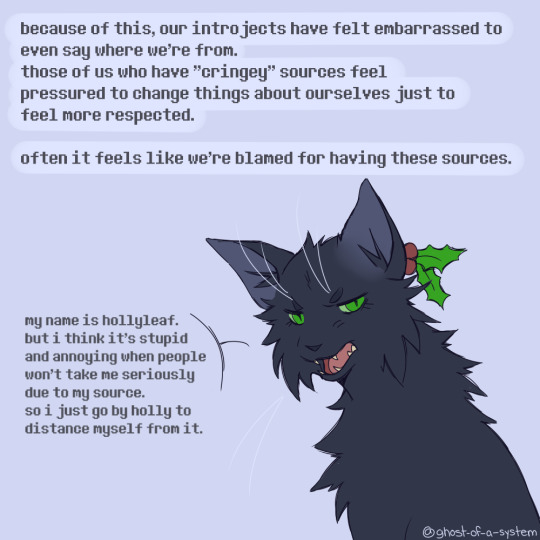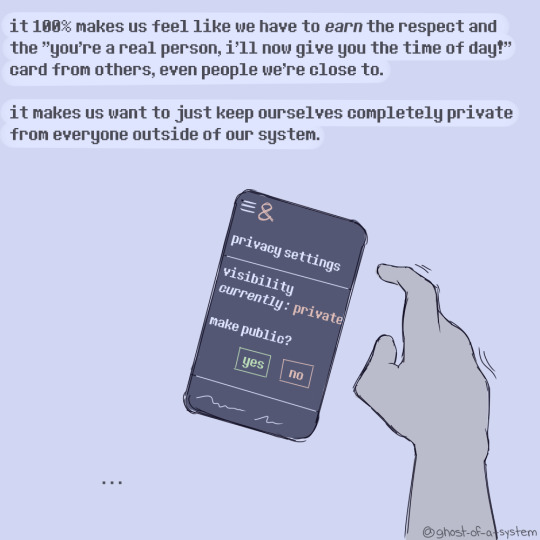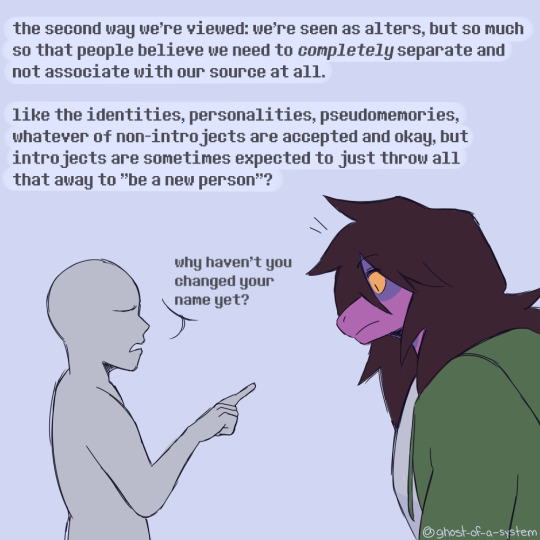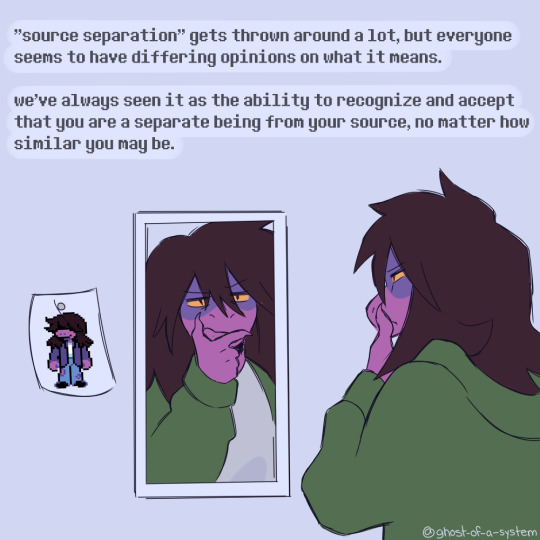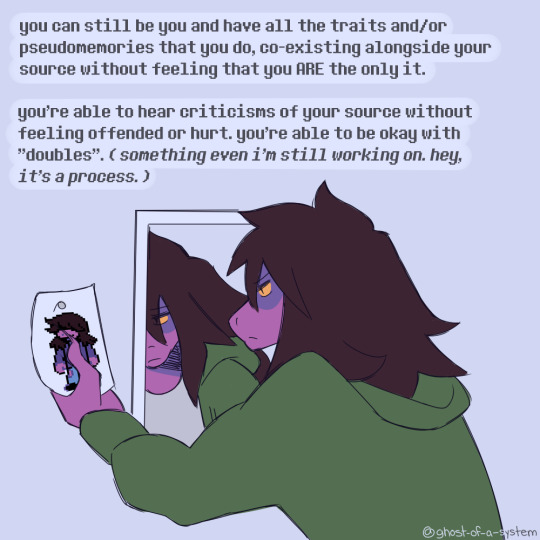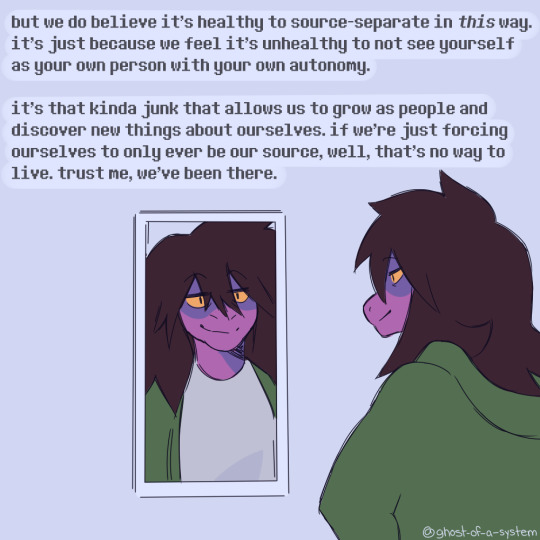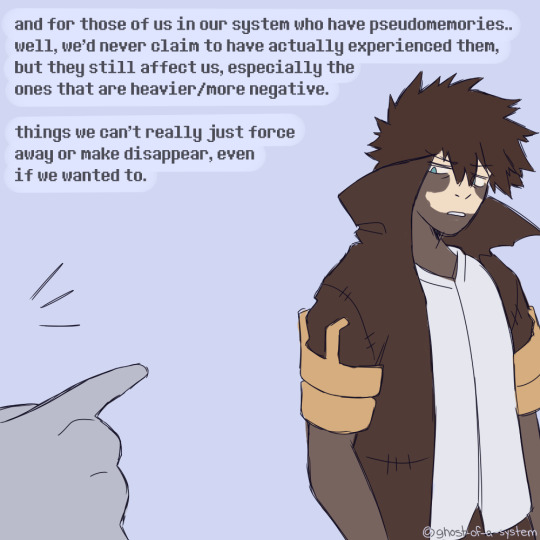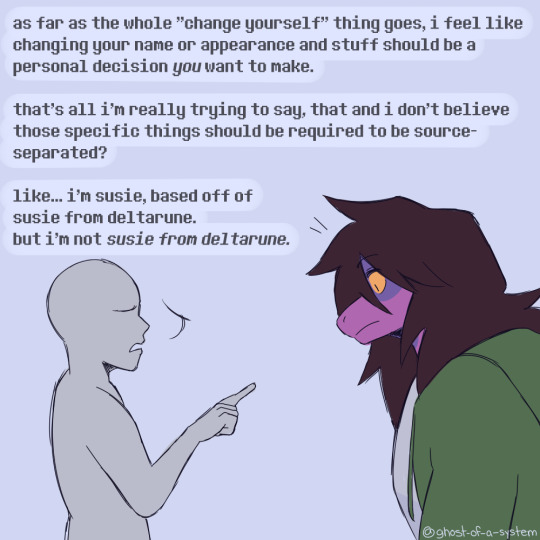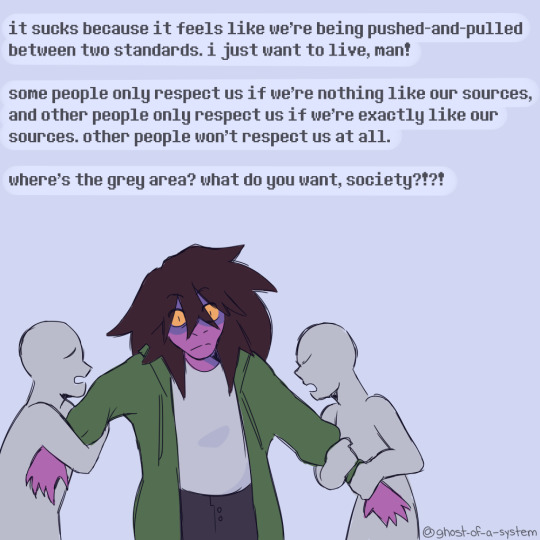Don't wanna be here? Send us removal request.
Text
If your "Introject friendly" space isn't friendly to introjects of people you don't like your space is not inroject friendly and you need ti rebrand it
If your "Introject friendly" space allows for people to negatively talk about introjects they don't like even if they aren't present in conversation your space is not introject friendly and you need to rebrand it
If your "Introject friendly" space has limits to what kind of introject you can be your space isn't inroject friendly and you need to rebrand it
If your "Introject friendly" space bans introjects for their sources your space is not introject friendly and you need to rebrand it
If your "Introject friendly" space is inaccessible to factives your space is not introject friendly and you need to rebrand it
Factives exist and we are introjects too
239 notes
·
View notes
Text
Lots of love to introjects who are very attached to their source(s) & who desire meeting sourcemates. Lots of love to introjects who aren't attached to their source(s) at all & would prefer to avoid sourcemates. Lots of love to introjects with obscure, unknown sources & to those with problematic sources.
There are so many ways one can experience introjectism & trying to fit everyone's experience into a box or tell them they're wrong for their experiences does so much harm. Every introject is unique & their own being ; some of you need to remember that.
127 notes
·
View notes
Text
Imposter Syndrom
A comic about fictives who feel the same as their source, yet not similar enough to it at the same time
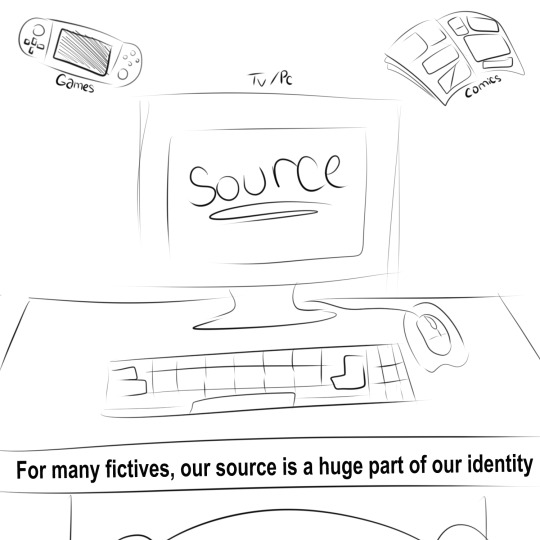
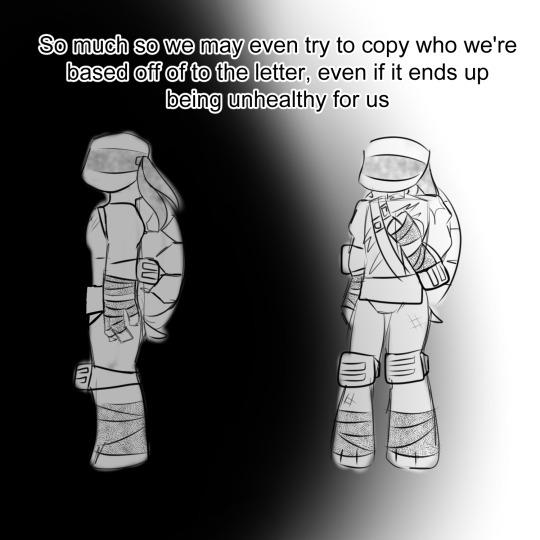

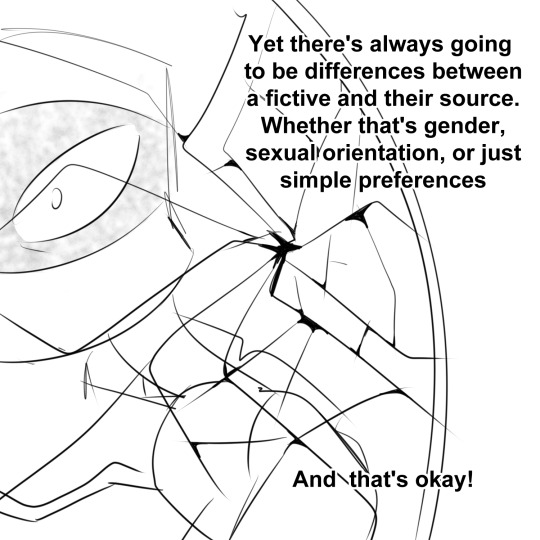
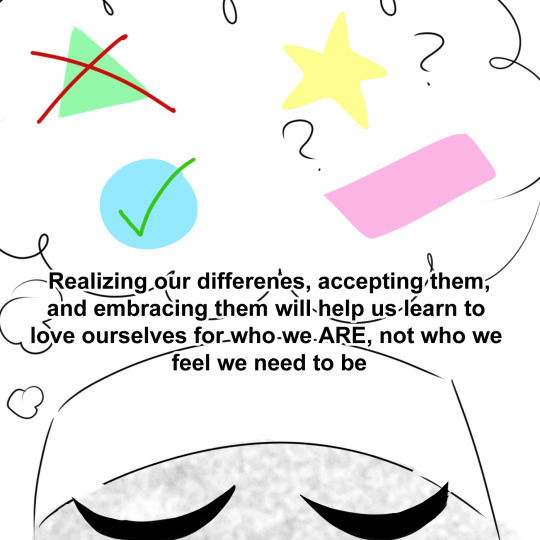
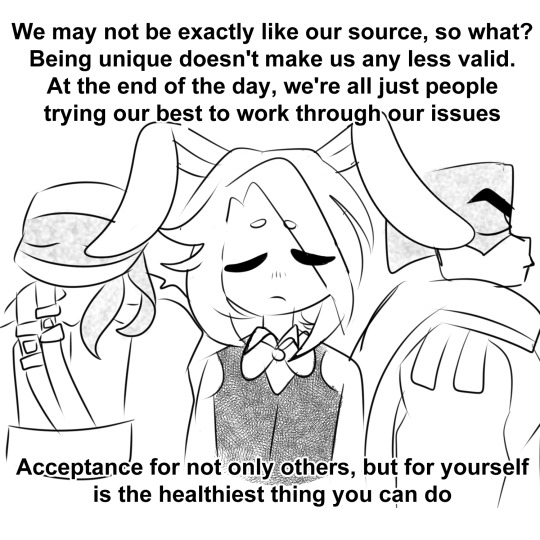
Of course, many fictives may not see themselves as their source at all, and that's okay! This post is just about those of us who do see ourselves as our source, but also struggle to cope with the differences we have from our source selves Many times fictives lack the physical, mental, and other skills that their source may have had. Perhaps as a fictive you don't identify with the same gender, sex, or sexual orientation as your source. Hell, maybe you just even like a different flavor of cupcake to them. Whatever the case may be, this post is a reminder that you don't have to try to be exactly like your source. You're free to be your own individual person; no one will see you as less. And if they do? Then that's their own problem. You're not just based off a fictional character, you're an actual person with your own set of traits and capabilities. Don't look down on them because they may not be exactly the same as you hoped. Enjoy what makes you unique
- Leo
185 notes
·
View notes
Text
Here's to systems who form introjects quickly!
Oftentimes, human brains can latch onto something we find relatable, comforting, etc., and systems are no different! Here's to those who find a source of enjoyment and then develop introjects from them!
Shoutout to:
Introjects from a popular piece of media
Headmates from more obscure sources, including ones people rarely hear about
Those who gained introjects because they saw themselves in a traumatized individual, and split someone based on them
People from problematic media they no longer watch/read/etc.
OC introjects
Introjects who are fragments from forming too quickly, resulting in a "half-baked" system member
And anyone else I missed!
It's completely fine to have introjects you gained really fast! You're not less real or invalid because of it! You're so beautiful!
Have a great one!
🖤💜💙💚💛
319 notes
·
View notes
Text
We have an introject of our mother. Of our father. Our middle school crush, our ex who was our partner of 14 years, a teacher, a friend of a friend. I wish people talked more about the introjects of the people around them. It took a long time for these parts of us to understand and realize they're not literally the people they introjected, and even longer to unlearn the behavior they picked up trying to be the source in our head. Telling us what to do and how to act.
They're replicas of our abusers and of people who are non longer in our life. A reminder of the people who affected us that we can't escape or ignore even when the person themselves are long gone.
And there's the introjects of people who are still in our life. How do I explain to people that I have a mirror image of my partner as a literal part of me? When that mirror image takes control of my mouth and body and eerily imitates the person they're based off of, in the very same room we're in?
I know the community likes talking about introjects of fictional characters or celebrities or streamers, people who you likely would never have a personal relationship with. I want more people talking about the introjects of people that existed in their lives and left such a mark that you carry them with you as a part of yourself. Maybe I just want to be less alone, being one of them myself.
786 notes
·
View notes
Text
the term "host". a short comic about being a system who, well, doesn't exactly have one.
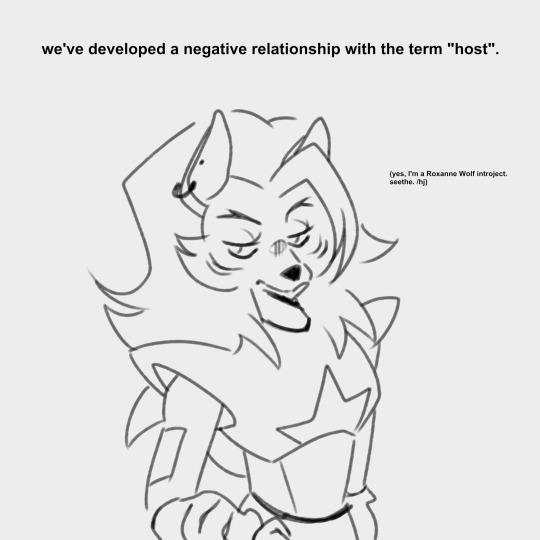
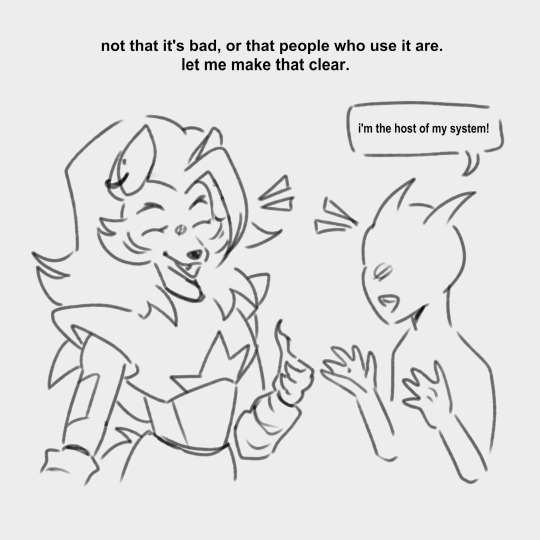
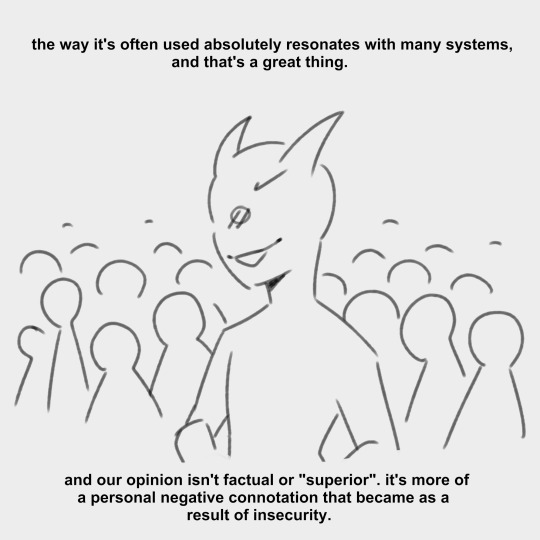
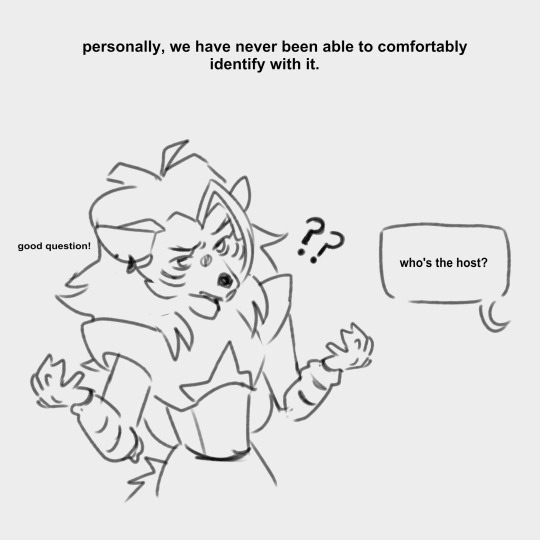
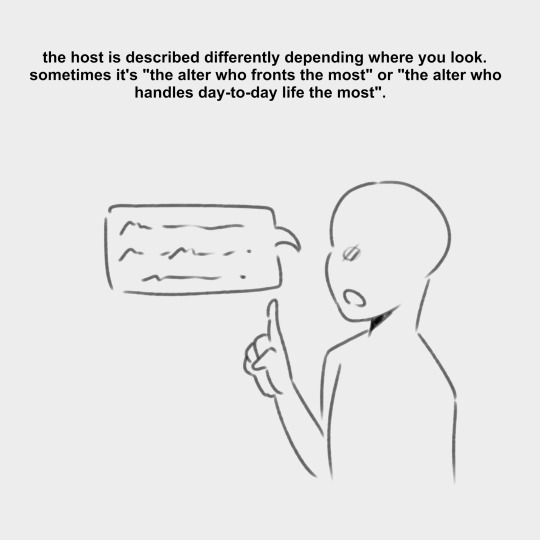
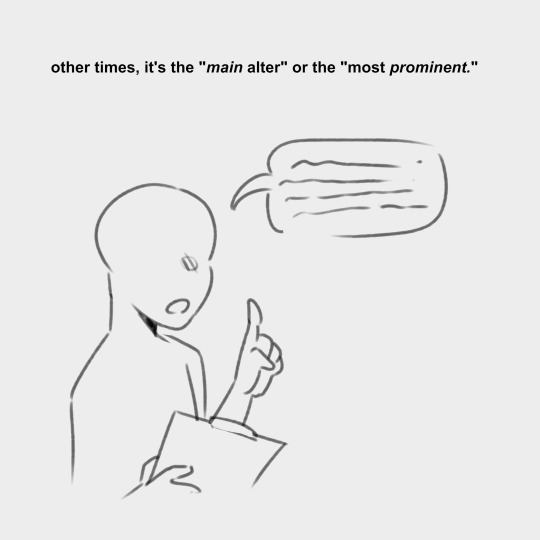
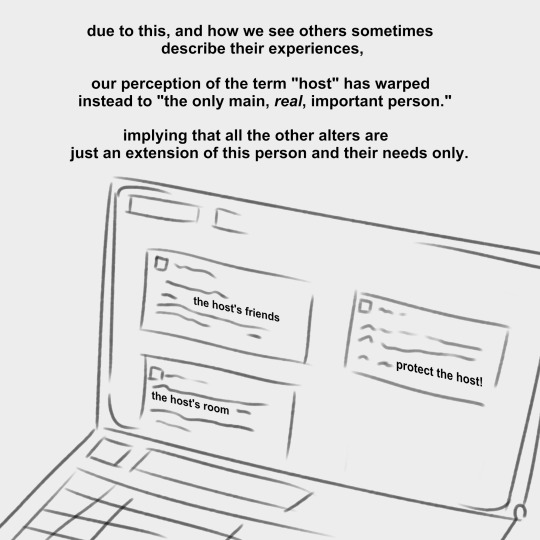
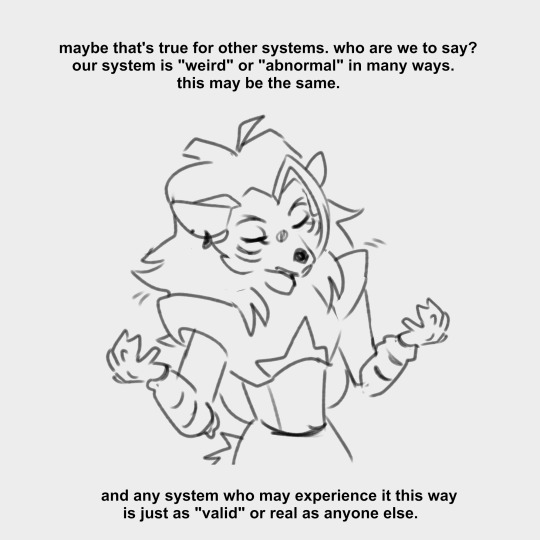
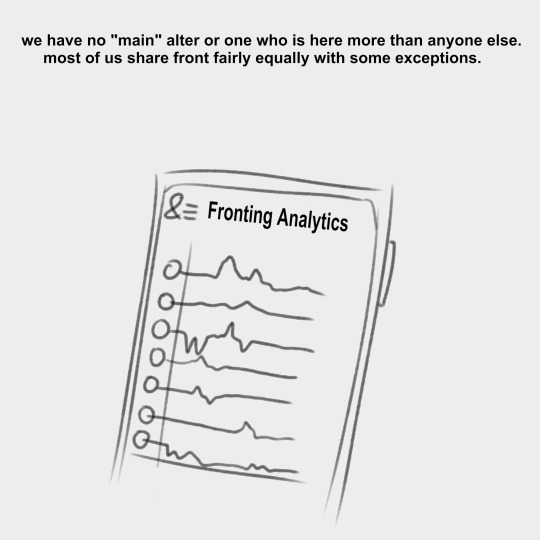
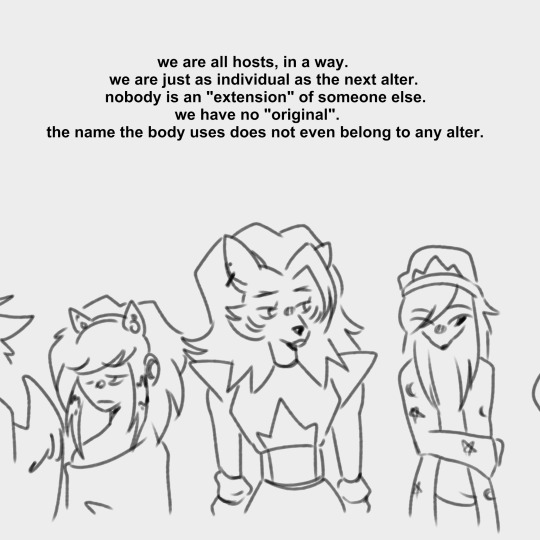
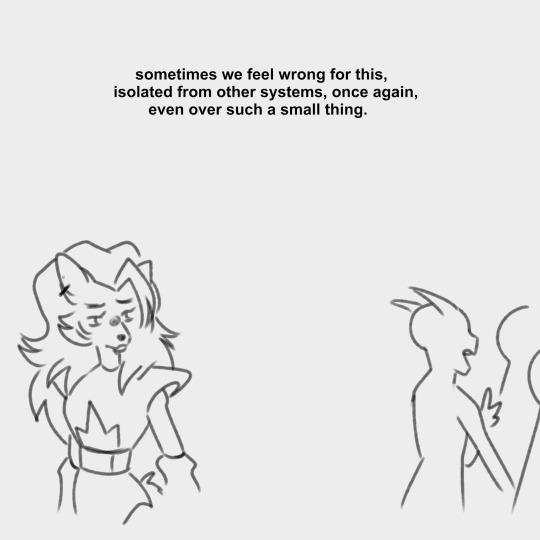

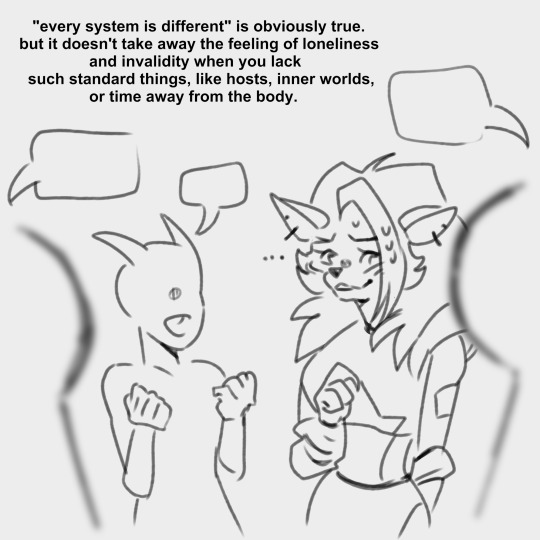
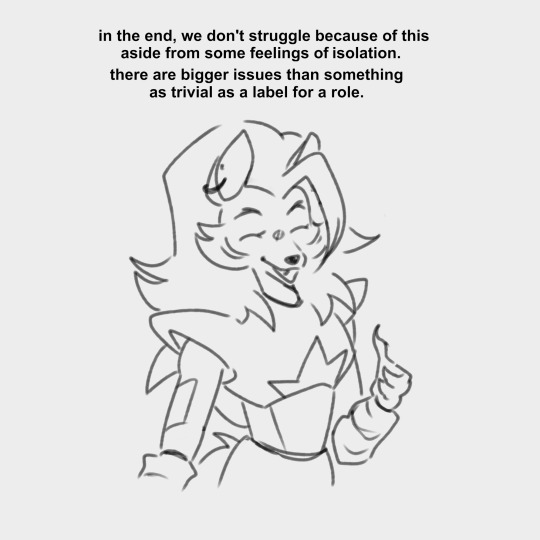
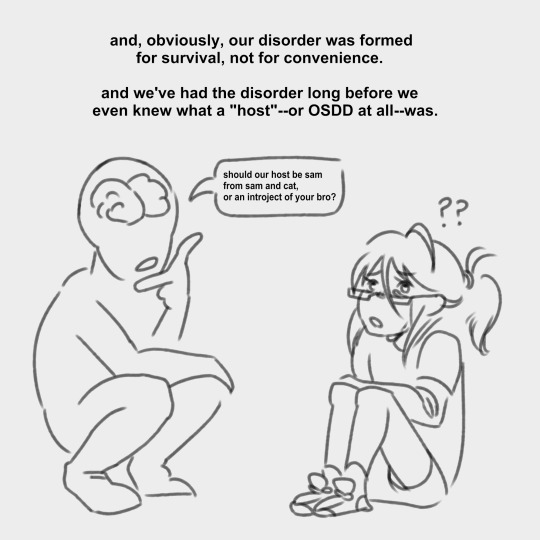
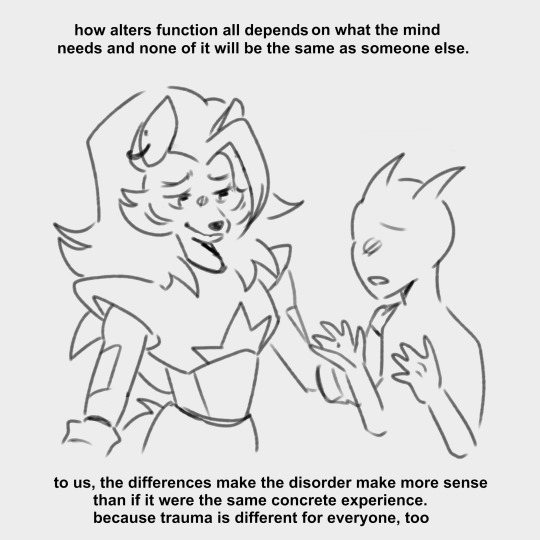
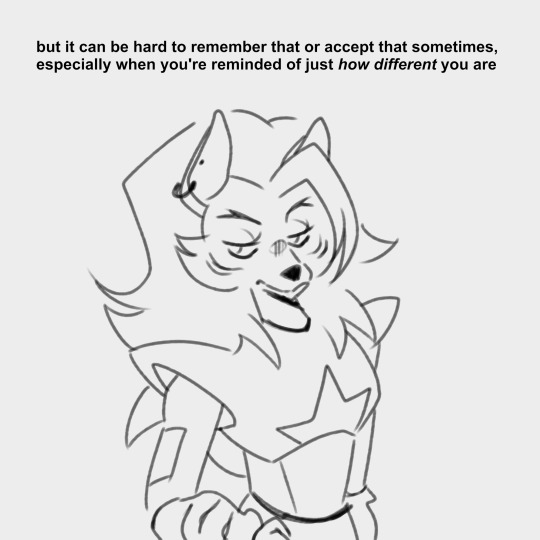

i really hope this post comes across right and not in a bashful or hateful light because that is !! not intended whatsoever!!
this is just a bit about the way some of our personal and inner struggles affect us, much like many of our posts, and is again just posted in case it may make anyone who relates feel seen (especially if it's an "obscure issue". i think we've only ever met one other system who doesn't have a host of some kind, and even then it was just because theirs went dormant and nobody took their place.)
we've never really had a host, or even actual co-hosts, from what we can remember. even in our earliest memories which we've looked back on from a system lens, there was (at least) two of us with no clear "main" one. that extended all throughout our teenage years up until now. it was always at least two who had no awareness of the other, but they were both here just as much as the other, "taking turns" fronting. weird stuff to try to make sense of.
we've tried to slap the host/co-host label on a few alters over time, but it never sticks and they always end up fronting just as much as anyone else or having their own other roles they front for. so i think we'll just stop trying to force it lol
822 notes
·
View notes
Text
I love you fictives with problematic or hated sources. I love you fictives that're terrified of showing up and existing around others because of terrible things that your sourceselves, source content, or creators have done. I love you whether or not the hate toward that fiction is justified because you're not your exact fictional source. You're real. I love you fictives that desperately try to explain yourselves and your situation because it was so different from the inside and you're trying so hard to be better. I love you fictives whose identity and experiences still mean a lot to you, and you're working every single day to balance that with the reality of media either harmful or perceived as harmful.
You're real. You're people. Your existence is not inherently terrible or amoral- only you decide your impact on this world.
[All plurals can interact, singlets can too if you don't clown]
589 notes
·
View notes
Text
i hate how almost every system online has to withhold certain information from others because theres people who are just... fucked up and will take advantage of systems. for christs sake, i cannot even talk about our littles or certain alters due to privacy and safety concerns. we are scared to even open up to our own therapist about certain things. i just want to talk about my system because i love and care for all of them, but people ruin it. it sucks. let systems live. please.
eros 🫀
610 notes
·
View notes
Text
introject culture is watching each other's sources and going "haha i love this show" and dipper pines is sitting next to you like "that was the worst moment of my life"
692 notes
·
View notes
Text
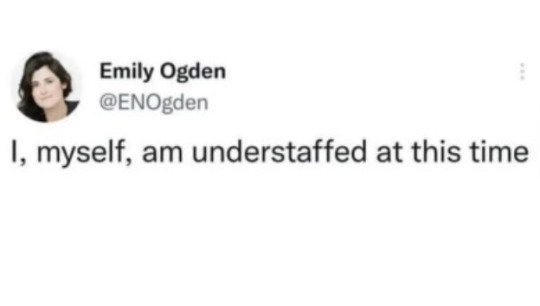
when your productive alter goes dormant
╰ 💿
1K notes
·
View notes
Text
Helping A Headmate Post-Dormancy
It can be really sad when a headmate goes dormant, and when they resurface, they may be upset, disoriented, and confused! This is a little guide on how to handle headmates exiting dormancy, and how to help them have a smooth transition back to every day life.
Disclaimer: This post is written from our experience and research into dormancy, and is not meant to be an end-all-be-all guide. We hope this post is useful, but it’s never meant to be a stand-in for therapy or professional help and resources.
What is dormancy?
Dormancy occurs in systems when a headmate seemingly vanishes, disappears, ceases communication, or otherwise cannot be reached by other members of the system. It is a pretty common occurrence - many systems have members who experience dormancy at some point in their lives.
Why do headmates go dormant?
A system member may go dormant for a wide variety of reasons. Some may go dormant due to being overwhelmed or faced with extreme circumstances that they otherwise aren’t used to. Conversely, some may go dormant when they system has reached a point of low stress, where everyone feels safe and secure. Sometimes the brain just decides a particular headmate isn’t needed for the time being and causes them to go dormant. It’s not always easy to pinpoint exactly why a headmate went dormant!
What is it like to come out of dormancy?
This also may vary from system to system and headmate to headmate. For some, it may feel like waking up from a long sleep. For others, it feels like time suddenly skipped 1, 5, or 10 years into the future. Headmates coming out of a dormancy may feel hazy, confused, upset, frustrated, or overwhelmed. They may be alarmed at not being able to recognize the body, their surroundings, or their loved ones. Or, they may readjust to every day life quickly with very few issues. Again, every system is different, and your headmates deserve to be treated as unique individuals!
How can my system help my headmate readjust to life?
There’s a few things you and your system can do to help a headmate who’s just come out of a dormancy:
1. Be prepared to answer basic questions, like “What year is it?” “Where am I/Where do we live?” “How old is the body?” along with more difficult questions like “Are we still in touch with people from our past?” “What are some current events/what’s happening in the world?” Remember there are no bad, wrong, or stupid questions and don’t judge your headmate for asking something that you had assumed was obvious.
2. Don’t expect them to front right away, or even want to interact with the system often. Coming out of a dormancy can be a jarring experience, and your headmate may need to take some time alone to readjust on their own terms. Even if you had really missed this headmate, it’s important to respect their wishes and give them space when they ask for it.
3. Recognize that dormancy may have changed or largely impacted the affected headmate, and they might not be the same as they were before they went dormant. They may have new ways of thinking and viewing themself, new opinions and ideas, and may even want to start going by a new name. Please give your system member room to explore their identity and grow how they wish, and don’t hold them up to expectations that were there before the dormancy.
4. Understand compromises may have to be made. The headmate might wish to return to an old way of life that your system doesn’t wish to return to. Keep an open dialogue, and be prepared to have difficult conversations, make sacrifices, and set boundaries. Communication is key for any system, and this especially goes for working with headmates post-dormancy to help them find a way of life that suits both them and the system. If they can’t return to their old ways, be ready to explain why in simple terms and provide support however you can.
5. Listen to them! Maybe none of these things will help your headmate who is readjusting to life, and that’s okay! Keep an open mind, hear them out, and try to accommodate them however you can, within reason. If some of your headmates have issues with the recently awoken headmate, look at some conflict resolution skills and try to work things out together. Know that clashes are sometimes inevitable, and be prepared to try and resolve potential issues in a fair and diplomatic way.
Where can I learn more about dormancy?
You can start by checking out these links!
And if you’re not already, consider speaking to a therapist about dormancy, your headmates, and how a dormant headmate may affect your system. Therapists are trained mental health professionals, and they may have good advice that can help your system cope with a headmate going dormant or waking up from a dormancy.
Questions? Comments? Thoughts on dormancy you’d like to share? Feel free to reach out - we’d love to hear from you!

(Image ID:) A pale orange userbox with a cluster of multicolored flowers for the userbox image. The border and text are both dark orange, and the text reads “all plurals can interact with this post!” (End ID.)
88 notes
·
View notes
Note
Hello! We saw your post about wanting to find non anti-endo spaces and misinformation on CDDs and wanted to just ask, what changed your opinion on endos? We ourselves are anti-endo but not aggressively or with malice (we dont even post things or interact with the community really, just lurk, so its not like were ANTI-endo ya know? Just that we dont believe or support them) we just want to understand because we ourselves havnt found any compelling evidence or experience that would point to the existence of DID(plurality) without trauma. This isnt to say we wish to challenge your own belief's at all!! Rather we honestly would like to know your thoughts because we see a decent amount of systems say things like "I use to be anti-endo until I was informed" and so if thats the case I would rather be informed! The only compelling argument ive found at this point is people connecting it to spirituality and while I find that a bit offensive as an ashiest who sees that a bit more like appropriation for the sake of religious belief's I understand its a bit of a gray area for most. Very sorry if this came off at all offensively or if this ask is upsetting or unwarranted in anyway please feel free to disregard if so! Its not our intention to cause issue or upset asking this, thank you for your time.
Hi there,
I've never been anti-endo, so I wouldn't say I really changed my mind regarding endos as much as I would say my understanding of endogenic plurals, traumagenic systems, and CDDs has deepened and shifted over time. When I first began learning more about plurality and DID, I didn't know much about endogenic plurals or how they worked nor how they related to DID, but I decided I would trust people on how they perceive their identity regardless of if I understood it perfectly or not and try to learn more.
Regarding your ask, I feel it is important to distinguish the concept of plurality from that of DID. Plurality is very broad; It simply refers to being more than one, which can take a massive variety of different forms because it relates to how people view the self and identity, which is subjective. It may be altered by spiritual, cultural, or individual beliefs, and in many contexts (especially regarding endogenic plurals) it is better understood through the lens of how both sociocultural and individual beliefs regarding the self interact and develop rather than through the lens of pathology.
The plurality seen in endogenic plurality is not the same per se as what many refer to as plurality in DID, or what I personally prefer to refer to as multiplicity in these discussions for clarifying sake so as to not use the same word with a differing definition.
In DID, the multiplicity has been theorized to reflect a divided personality system, or dissociated parts, which is not the same as the plurality described by endogenic plurals. In practice, however, the lines may appear very blurred, as clinical understanding and pathology also interacts with individual beliefs regarding the self and the state of their multiplicity; as an example, many people with DID strongly reject the framework of parts, and prefer to refer to their system's members as people they share a body with, often because they hold individual beliefs regarding what defines personhood that affects the language which they use to describe their system. As endogenic plurals also often describe their headmates as people they share a body with, the difference may not be immediately clear.
To further complicate matters, individual beliefs regarding the self, one's life, and one's identity may also alter the view of how a person believes their system to have formed even if they are DID. I've met many systems who are DID but who also identify as endogenic for a variety of reasons related to how they make sense of their life and memories as well as their sense of self and identity. To give a more specific example, I've known several DID systems who say they were born plural for a variety of reasons (some psychological, some spiritual) but who additionally experienced childhood trauma which they view as the origin of their DID seperate from the origin of their plurality.
It is my opinion that these differences in beliefs and labels are not inherently harmful nor misinformed because they are based in subjectivity, and they may even be beneficial for many people as it gives them a framework to make sense of themselves in that is unique to their individual experiences.
Regarding evidence and endogenic plurality, I also believe that fixating so much on clinical evidence or proof through studies is to misunderstand fundamentally that plurality and multiplicity both relate to an understanding of self that is not objective and as such cannot be easily measured through objective means. The self is not something that is easily understood solely through the context of clinical study; rather, by only examining the self through this lens, you limit your understanding of the self. Rather than a fixation on an evidence which is not easily obtained nor measured, I instead encourage a frameworks-based understanding of plurality, which is already done for multiplicity (the Theory of Structural Dissociation is a framework).
To summarize, DID is a trauma-based disorder, however the multiplicity described in DID is not necessarily the same as the plurality described by endogenic plurals. As well, while a clinical understanding of DID is incredibly important, it is also meaningful to consider how sociocultural and individual beliefs interact with this understanding and how they may alter the way people identify, especially regarding the aspect of multiplicity and self. Lastly, a frameworks-based approach to endogenic plurality such as plurality through the lens of individual beliefs regarding the self may be more useful to understanding endogenic plurality than a focus on clinical evidence is.
28 notes
·
View notes
Text
Had a friend wondering this and this is a question we’ve answered before but I figured making a post for the masses would be useful.
Question:
“How much of childhood is normal for someone to forget?”
Upon asking a plethora of non-traumatized people, this is what we’ve gathered as a “normal” capability of remembering in terms of childhood. Remember…NON-TRAUMATIZED people are who we are talking about, or at least non-CPTSD people, because trauma is inherently a part of life.
-Most people in their teens can remember most of their childhood, both good and bad parts of the childhood. They can typically remember as early as age 5, and usually remember good things or extremely bad one-off events with more clarity.
-people in their 20s can typically remember about the same as teens can, though it may get fuzzier as they get older, and those “core memories” are the ones they can recall the best, though if someone reminds them of a moment in their childhood they wouldn’t normally be able to recall off the bat, they can then remember that with pretty full clarity. (“Remember that one time you ate all that candy at the holiday dinner! Haha! You got so sick!” “Oh right!!! Yeah, that was AWFUL!!”) Typically they can still remember as early as age 5-7, and can remember after age ten extremely well, and can definitely remember their teen years.
-people in their thirties and forties usually remember core memories, typically moments of extreme happiness or extreme sadness. They usually remember their lives in milestones rather than ages. (“The year I got my first bike” or “the year I got that one tattoo”) Again, if they are reminded of something they can typically remember it with pretty decent clarity. Their memories of very early childhood are pretty degraded unless reminded, but recall is usually as far back as age 7-10.
-people older than 50 can usually remember major life events in their childhood, and often remember their teen years pretty well. Like the 30-40s people, they usually remember their lives in milestones rather than ages. Marriage, people they dated, new jobs, etc. Recall deteriorates as they get older and older, so they will usually only be able to easily recall moments in their teen years at this age, and major life events in their childhood may not have as much clarity, but they still can remember, especially when reminded. Once old age related memory loss sets in, this becomes more difficult and recall memory deteriorates a LOT as they grow older, but being reminded of things can usually jog their memory.
How our old host remembered our childhood on a day to day basis before system discovery:
-Pre age 10 was sporadic, and only positive memories. Most things were only remembered because people told them stories about the memories, but not because they actually remembered living it.
-huge memory gaps in various years after age 10, but that was covered up pretty easily with a few sporadic positive memories sprinkled in there, making them believe that their life had been peaches and cream for most of their life. They split up as our host when we were 17 years old and that’s when their own working memory really starts, so they could remember both good and bad after age 17, which made them believe that only bad things happened after that age because they couldn’t remember anything bad before that unless they were told something bad happened.
This is coming from an HC-DID system who used to have extremely high amnesia barriers between trauma holding parts and non-trauma holding parts, though. These days there is a lot more memory sharing, but we are also 25 and not in trauma time anymore so that is possible.
182 notes
·
View notes
Text
when people say they have amnesia that means? they have amnesia???
that doesn’t mean ‘whoopsies i forgot an appointment once im so silly’
it can mean they have huge gaping gaps in my memory but it also mean:
forgetting small things that they dont remember forgetting
forgetting anniversaries, birthdays, holidays
forgetting things, remembering that they forgot something but can’t remember it
remembering things out of order
remembering things blurred
and more !! but its usually some fucked up amalgamation
no i don’t forget everything but i forget a lot! a lot of stuff that causes me distress, not remembering important life events, the last friend hangout, and more all fucking suck!
so no its not something that just makes me quirky it significantly impacts my quality of life.
83 notes
·
View notes
Text
Not all amnesia is equal.
Some systems have partial blocks, not remembering close friends names or frequent fronters' favorite foods when asked.
Some systems have full blackouts to where alters aren't aware of any external elements prior to fronting and learning them.
Some systems forget memories and traumas. Some systems have alters that shove away memories so those who can't handle the information don't see it.
Sometimes alters won't even know there is amnesia within their system.
Sometimes they won't know what they've forgotten.
All amnesia is not equal, however, all amnesia is important to acknowledge.
Amnesia is tough to work around but you can work through it. You can improve system communications and healing.
Keep your head up.
Dazai (he/him)
Morgue System
1K notes
·
View notes
Text
I stumbled across this on Reddit and thought it would be helpful for some people. It’s a website made by a system for systems. It includes:
A section to add altars and informations about them.
A feature to nest another system under the main one, so a feature to have subsystems.
A wish list where altars can add anything they’d like, it’s also possible to mark a wish as “granted”.
A section where you can describe your inner world.
System rules, a section where you can rules your system collectively agrees on.
Worksheets - Expanding but currently includes A Safety Plan, Before During After Plan, an exercise to invite altars to front and message in a bottle, (a place to let out your feelings).
A communal journal where altars can make posts.
Each altar can have there own journal that they can password lock if they want to
This is not a social website, there’s no feature to chat with other systems. It’s a safe place for people with PTSD and DID to explore there thoughts and feelings, identify there parts and develop healthy and positive communication internally.
333 notes
·
View notes

